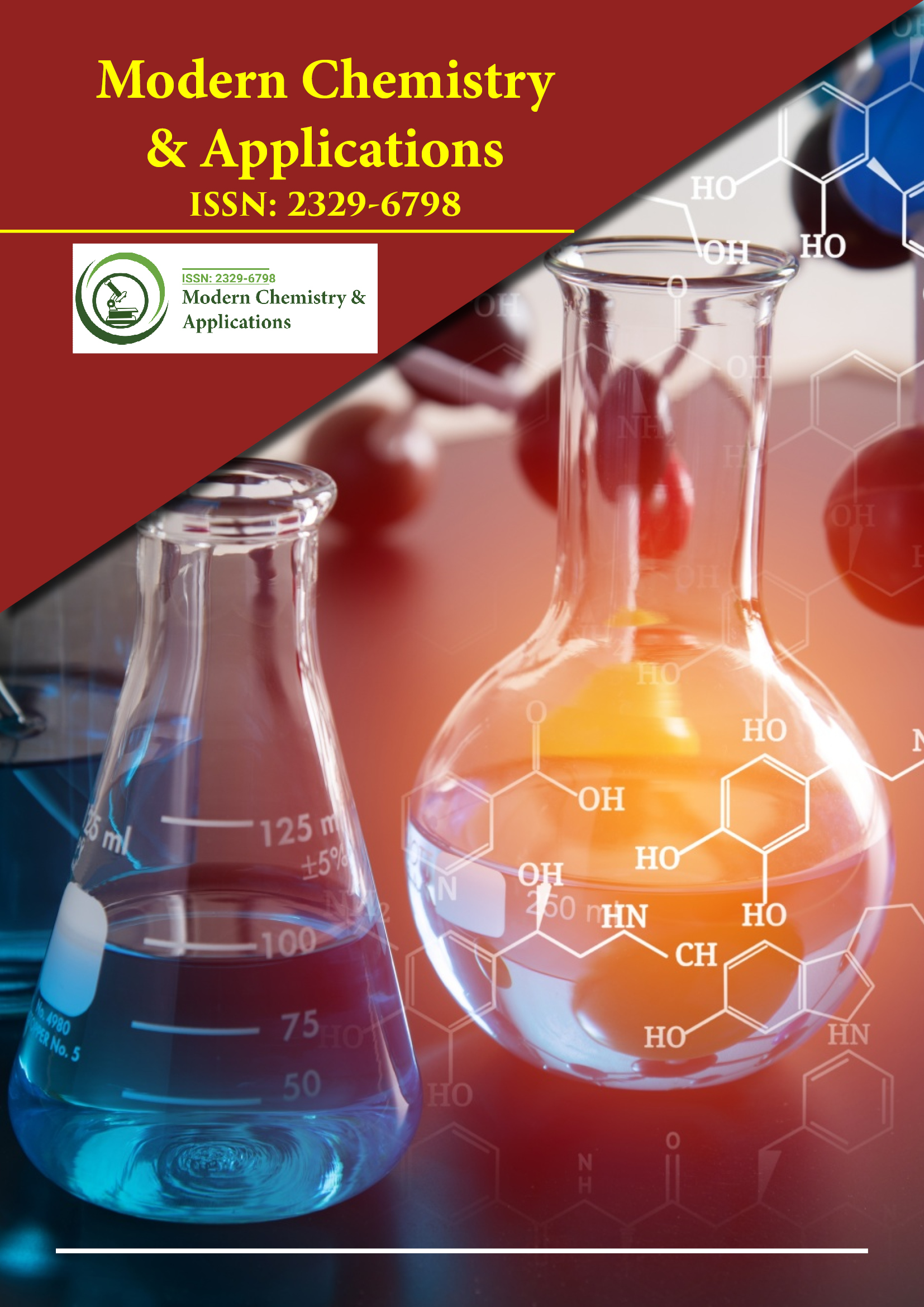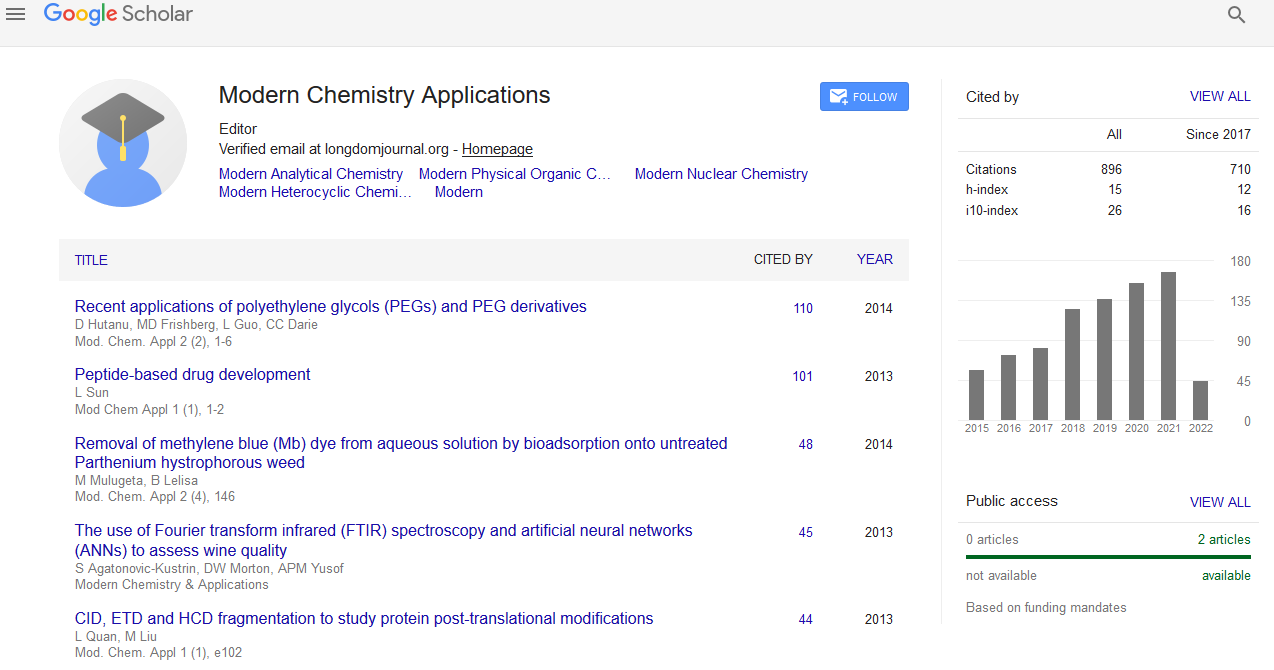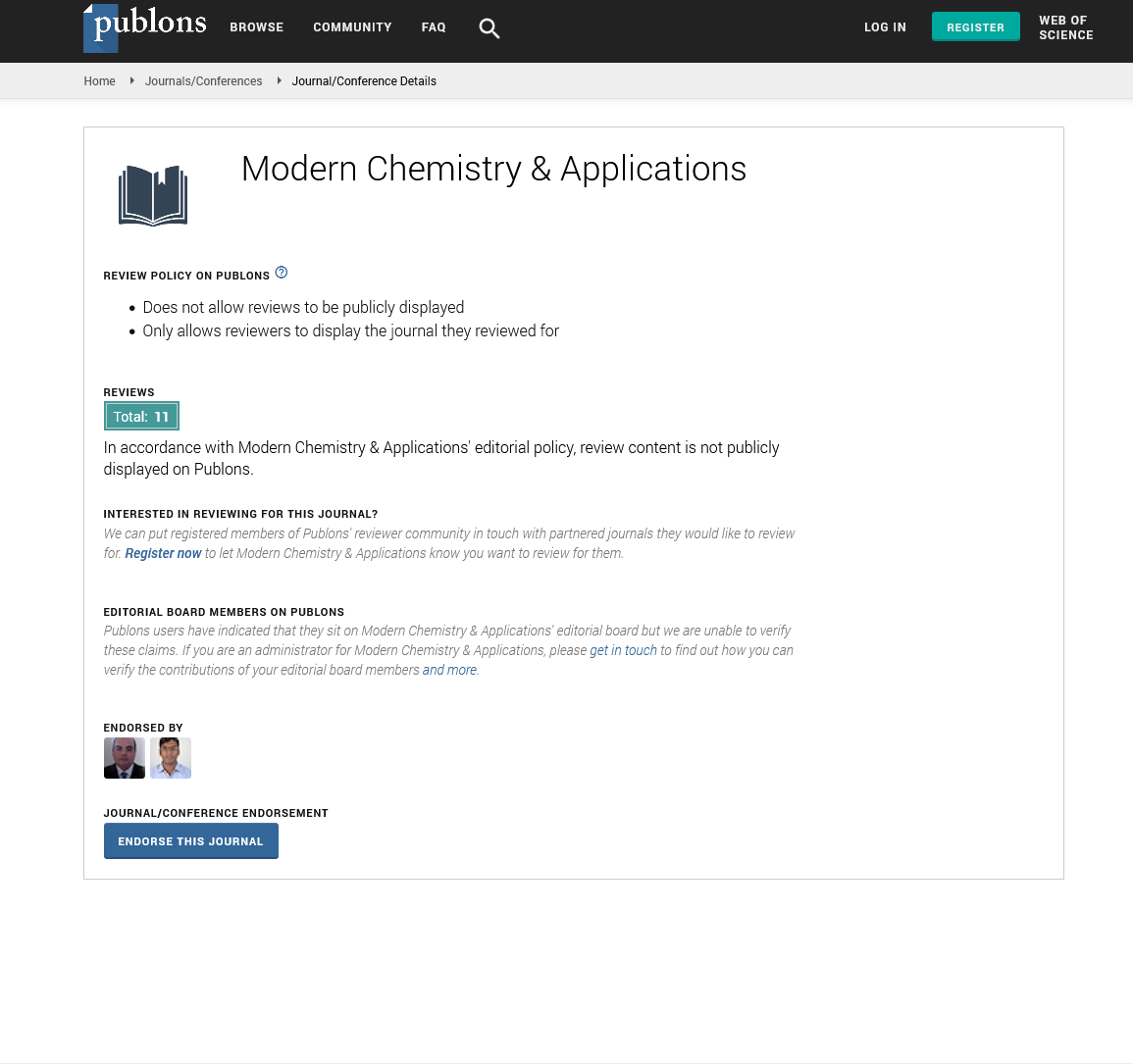Indexed In
- Open J Gate
- JournalTOCs
- RefSeek
- Hamdard University
- EBSCO A-Z
- OCLC- WorldCat
- Scholarsteer
- Publons
- Geneva Foundation for Medical Education and Research
- Google Scholar
Useful Links
Share This Page
Journal Flyer

Open Access Journals
- Agri and Aquaculture
- Biochemistry
- Bioinformatics & Systems Biology
- Business & Management
- Chemistry
- Clinical Sciences
- Engineering
- Food & Nutrition
- General Science
- Genetics & Molecular Biology
- Immunology & Microbiology
- Medical Sciences
- Neuroscience & Psychology
- Nursing & Health Care
- Pharmaceutical Sciences
Short Communication - (2024) Volume 12, Issue 1
Tradition and Technology: Advancing Clinical Applications of Traditional Chinese Medicine
Yongping Xui*Received: 01-Jan-2024, Manuscript No. MCA-24-25212; Editor assigned: 03-Jan-2024, Pre QC No. MCA-24-25212 (PQ); Reviewed: 17-Jan-2024, QC No. MCA-24-25212; Revised: 24-Jan-2024, Manuscript No. MCA-24-25212 (R); Published: 31-Jan-2024, DOI: 10.35248/2329-6798.24.12.453
Description
Traditional Chinese Medicine (TCM) stands as a testament to the constant understanding of ancient civilizations, containing centuries of knowledge in the complex formulations of herbs, minerals, and natural substances [1]. In recent decades, a rise in interest in TCM from the scientific community has determined the investigation of its bioactive components, using advanced methodologies to analyze their mechanisms of action. This article explores an extensive drive through the current region of study, the methodologies employed, and the evolving trends that shape our comprehension of these bioactive components in TCM formulae.
Modern research approaches
Modern research approaches have brought the study of TCM formulae into a new era of scientific exploration [2]. The advent of advanced analytical techniques has developed our understanding of these ancient remedies, providing innovative insights into their chemical composition and pharmacological activities [3]. Techniques such as chromatography, mass spectrometry, and nuclear magnetic resonance spectroscopy stand as essential things in the supply of researchers, enabling the identification and quantification of bio-active components within TCM formulations with unique attention [4].
Furthermore, the integration of molecular biology and bioinformatics methodologies has exposed novel approaches for resolving the complex mechanisms underlying TCM's therapeutic effects. Transcriptomics, proteomics, and metabolomics offer a comprehensive view of the molecular pathways modulated by TCM treatments and explain their adaptable modes of action. These advanced approaches allow researchers to search deep into the molecular region of TCM, uncovering the complex interactions between bioactive compounds and biological targets.
In addition to these methodologies, emerging technologies such as machine learning and artificial intelligence are increasingly being employed to analyze vast datasets generated from TCM research. These powerful methods enable researchers to identify patterns, predict potential drug interactions, and uncover novel therapeutic targets within TCM formulae. By controlling the power of computational approaches, researchers can accelerate the discovery process and resolve new insights into the therapeutic potential of TCM.
Traditional understanding and modern science
A defining feature of contemporary TCM study is the absolute combination of traditional understanding with modern scientific inquiry. By connecting ancient principles with advanced methodologies, researchers seek to validate the efficacy of TCM formulae, decode their mechanisms of action, and expand their clinical applications.
Network pharmacology represents this integrative approach, offering a complete framework for analyzing the complex interactions between TCM compounds, targets, and diseases [5]. By mapping out the complex networks of biological pathways influenced by TCM, researchers gain a deeper understanding of its systemic effects and therapeutic potential [6]. This comprehensive perspective allows for the identification of synergistic interactions between bio-active components and the explanation of their collective impact on physiological processes.
Interdisciplinary collaborations further improve this symbiotic connection between traditional wisdom and modern science [7]. By bringing together experts from diverse fields, including traditional medicine, pharmacology, genetics, and systems biology, researchers can leverage complementary perspectives to tackle complex research questions and drive innovation in TCM research.
Clinical applications and future perspectives
The convergence of traditional knowledge and scientific accuracy has prepared for evidence-based applications of TCM in clinical practice. Rigorous clinical trials investigating the safety and efficacy of TCM formulae across a spectrum of diseases, including cardiovascular disorders, cancer, and neurodegenerative conditions, continue to yield potential results, maintaining confidence in TCM's therapeutic efficacy [8,9].
Looking ahead, interdisciplinary collaborations will play a vital role in advancing our understanding of TCM formulae and maximizing their clinical utility [10]. By advancing discussion between researchers, clinicians, and traditional practitioners, we can control the collective wisdom of diverse perspectives to address complex health challenges and optimize patient outcomes.
Conclusion
In conclusion, the exploration of bioactive components within TCM formulae represents a pleasant synthesis of ancient understanding and modern science. Through the convergence of diverse methodologies and interdisciplinary collaborations, researchers are resolving the complex and unexplainable nature of TCM and its extreme therapeutic potential. As we continue to set new limits in TCM research, we move closer to realizing its transformative impact on global healthcare and entering an era of overall healing and well-being.
References
- Xutian S, Zhang J, Louise W. New exploration and understanding of traditional Chinese medicine. Am J Chin Med. 2009;37(03):411-26.
[Crossref] [Google Scholar] (All versions) [PubMed]
- Jiang H, Chen M. The advantages of connectivity map applied in traditional Chinese medicine. Front Pharmacol. 2021;12:474267.
[Crossref] [Google Scholar] [PubMed]
- Zilani MN, Sultana T, Rahman SMA, Anisuzzman M, Islam MA, Shilpi JA, et al. Chemical composition and pharmacological activities of Pisum sativum. BMC Complement Altern Med. 2017;17(1):1-9.
[Crossref] [Google Scholar] [PubMed]
- Gao X, Yang L, Bai Y, Li Q, Zhao X, Bian L, et al. Screening of bioactive components from traditional chinese medicine by immobilized β2 adrenergic receptor coupled with high performance liquid chromatography/mass spectrometry. J Chromatogr B Analyt Technol Biomed Life Sci. 2019;1134:121782.
[Crossref] [Google Scholar] [PubMed]
- Jiashuo WU, Zhang F, Zhuangzhuang LI, Weiyi JI, Yue SH. Integration strategy of network pharmacology in Traditional Chinese Medicine: A narrative review. J Tradit Chin Med. 2022;42(3):479.
[Crossref] [Google Scholar] [PubMed]
- Tang JL, Liu BY, Ma KW. Traditional Chinese medicine. The Lancet. 2008;372(9654):1938-40.
[Crossref] [Google Scholar] [PubMed]
- Jiang WY. Therapeutic wisdom in traditional Chinese medicine: A perspective from modern science. Trends Pharmacol Sci. 2005;26(11):558-63.
[Crossref] [Google Scholar] (All versions) [PubMed]
- Yang MQ, Song YM, Gao HY, Xue YT. Efficacy and safety of Fuzi formulae on the treatment of heart failure as complementary therapy: A systematic review and meta-analysis of high-quality randomized controlled trials. Evid Based Complement Alternat Med. 2019.
[Crossref] [Google Scholar] [PubMed]
- Lin Z, Zheng J, Chen M, Chen J, Lin J. The efficacy and safety of Chinese herbal medicine in the treatment of knee osteoarthritis: An updated systematic review and meta-analysis of 56 randomized controlled trials. Oxid Med Cell Longev. 2022.
[Crossref] [Google Scholar] [PubMed]
- Guo DA, Lu A, Liu L. Modernization of traditional Chinese medicine. J Ethnopharmacol. 2012;141(2):547-8.
[Crossref] [Google Scholar] [PubMed]
Citation: Xui Y (2024) Tradition and Technology: Advancing Clinical Applications of Traditional Chinese Medicine. Modern Chem Appl. 12:453.
Copyright: © 2024 Xui Y. This is an open-access article distributed under the terms of the Creative Commons Attribution License, which permits unrestricted use, distribution, and reproduction in any medium, provided the original author and source are credited.


